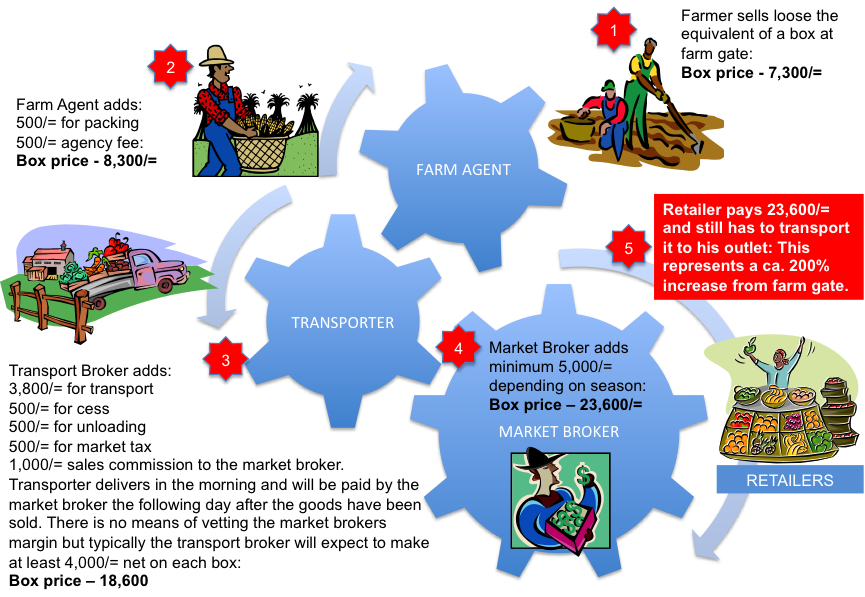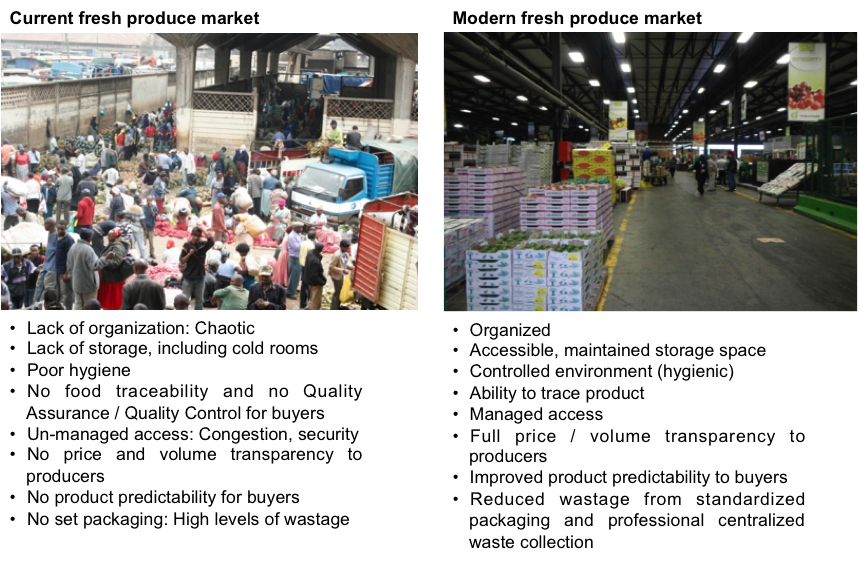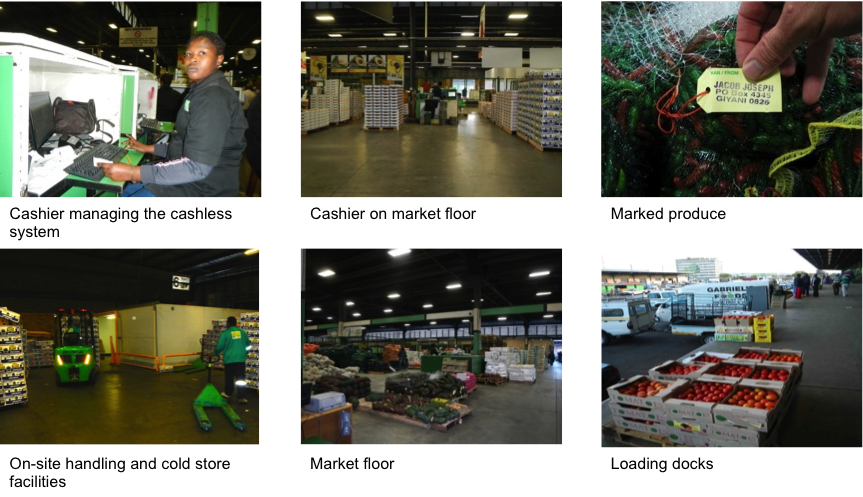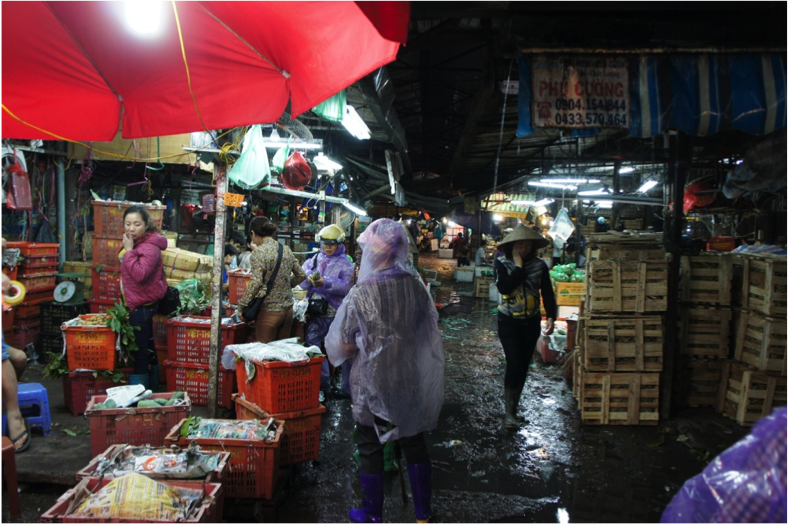This is a longer version of an article that appeared in the Swiss Development Cooperation newsletter. The authors are Tanja Havemann, Rory Nightingale (Sasumua Holdings, Tanzania), Pete Veal (Syngenta, Switzerland) and Michael Cordes (Institute of Market Agents – IMASA, South Africa). The authors represent EAFM, which is seeking complementary regional partners and supporters, in particular fresh produce growers, technology providers, and funders who can support development and implementation of EAFM in a manner that leverages significant social and environmental benefits. We would welcome any advice, suggestions, references and contacts to make this market revolution a reality!
Hon. Yusuph Mwenda, Mayor of Kinondoni, Dar es Salaam:
“As the East African Community, and Tanzania, continue to grow, it will become increasingly important to ensure that local and regional consumers are linked to producers to promote both rural and urban sustainable development. The East Africa Farmers Market initiative is an important step towards ensuring that this happens.”
Jacqueline Mkindi, Chief Executive of the Tanzania Horticultural Association (TAHA):
“We support the East Africa Farmers Market because it recognizes the growing importance and demand of linking our economic growth with agricultural development. We all know that trade is a pillar of growth, be it between continents, countries or cities. To sustainably grow, we need to focus not only on trade between continents, but also on domestic and regional trade. The East Africa Farmers Market initiative is one step towards addressing this – ensuring that our growth is not only tied to markets overseas, but also to our own consumers.”
Why markets?
The ability of buyers and sellers to easily find each other, and have the right conditions for efficiently conducting transactions (i.e. markets) is fundamental to a functioning economy. Transactions have repercussions down supply chains and enable communication between buyers and producers on quality, price, volumes, and other values, including social and environmental aspects. Professional Fresh Produce Markets (FPMs) can successfully and transparently facilitate price discovery, based on market forces (supply and demand).
This is important, because urban centers in emerging markets are booming. By 2025, 60% of the worlds’ new urban consumers will live in the emerging 440 cities. While there has been much focus on urban buildings, water and power, relatively little attention has been given to food, including market infrastructure linking domestic and regional urban consumers with producers (farmers). This is particularly so for fresh produce.
Conservative estimates based on World Health Organization data suggest that daily consumption of fresh produce will increase by 3 to 5x between 2009 and 2025 in East Africa. Dar es Salaam (Dar) will have one of the highest regional increases. The World Bank predicts that by 2027 more Tanzanians will live in urban areas than in the countryside, and Dar will be a megacity with a population of over 10m.
In most emerging market cities, fresh produce is sourced through disorganized, fragmented and in-transparent value chains, supplemented by imports. This undermines the ability of local consumers to signal their demands to local and regional producers, and, consequentially their capacity to effectively react. Our research indicates a 200% increase in commodity price of fresh produce, from farmers (producers) to retailers in Tanzania. Intermediaries capture most of this margin. Prices are largely obscured from farmers, and product quality standards are out of sync with buyer demands.
Improving market linkages can therefore have significant positive impacts for local farmers. Creating both the opportunity for them to capture more value from production, and by catalysing investment into primary production, local processing and distribution.
Domestic fresh produce markets: vital for agricultural development
While much attention has been given to important issues such as supporting farmers in production (supply), relatively little has been given to demand, in particular domestically. Without access to professionally-run Fresh Produce Markets (FPMs) there is little real opportunity for sustainable agricultural development. This has been noted, e.g. by Wageningen University who call for donors and development partners to pay more attention to domestic markets. Similar observations about the importance of FPMs were drawn after an assessment of the Africa Regoverning Markets initiative.
Investing in FPM provides opportunities for local producers and consumers, as well as intermediaries (traders), who play an important role in facilitating transactions. Commission based FPMs change the rules of the game so that traders work as commission agents for farmers.
This is not fantasy: Commission-based FPMs have existed in South Africa since the 1860’s: over 30% of South Africa’s fresh produce is traded through FPMs, and FPM turnovers have been increasing despite increasing competition. This has arguably contributed greatly to the development and of South Africa’s agricultural sector, enabling it to attain national food self-sufficiency and become a major global exporter. These are not quaint farmers markets; rather they are efficient fresh produce clearinghouses, enabling transparent price, volume and quality discovery between producers and their commission agents on one side, and wholesale buyers on the other.
What do we mean by investing in markets?
This means investing in locally appropriate ‘hard’ and ‘soft’ infrastructure:
Hard infrastructure refers to market buildings, weighing and storage facilities (this may also include strategically located energy-efficient cold stores).
Soft infrastructure refers to cash-less payment systems and mobile-accessible online databases where volumes, grades and prices of goods sold can be tracked. It also includes robust governance frameworks that enforce a fair, transparent and professionally run market.
‘Soft infrastructure’ also includes establishment of a market authority (manager), which acts as a custodian, setting and enforcing market rules, so that they are fairly governed, and serving all stakeholders equally and effectively to maintain the FPM ethos of transparency, efficiency and effectiveness. The market authority governs the actions of stakeholders, including producers, buyers and commission agents. In a professional FPM, commission agents are in a fiduciary relationship with producers, whereby they service producers’ customers (buyers), enable trading and competition on a daily basis.
What are we doing about it?
The commission based FPM is proven model that we believe should be accelerated in East Africa. In fact, the model is already spreading organically to new areas in South Africa (Mooketsi and Polokwane) and surrounds (Rundu in Namibia), and markets transforming from disorganized, informal, places of trade to vibrant commission-based markets with rules, infrastructure and capacity to cater for local demands.
We have established the East African Farmers Markets (EAFM) initiative, an innovative cross-sector partnership established to develop efficient, professional and modern fresh produce markets across the region for the benefit of consumers and producers – large and small. EAFM is being piloted in Dar es Salaam through the Soko Fresh Market. EAFM members include producers and agribusinesses (Tanzanian Horticultural Association – TAHA, Finlays, Syngenta, Mtanga Foods and Thirty Degree East), solution and service providers (FreshMark Systems, Unicool, RSA, IMASA and Clarmondial). EAFM members are investing their own resources in a pilot project, in recognition of the important leveraging role that such markets can have in enabling inclusive economic growth.
We believe that the pilot will have relevant lessons for urban centers in all emerging markets, and are seeking complementary partners to help make this pilot a reality.





